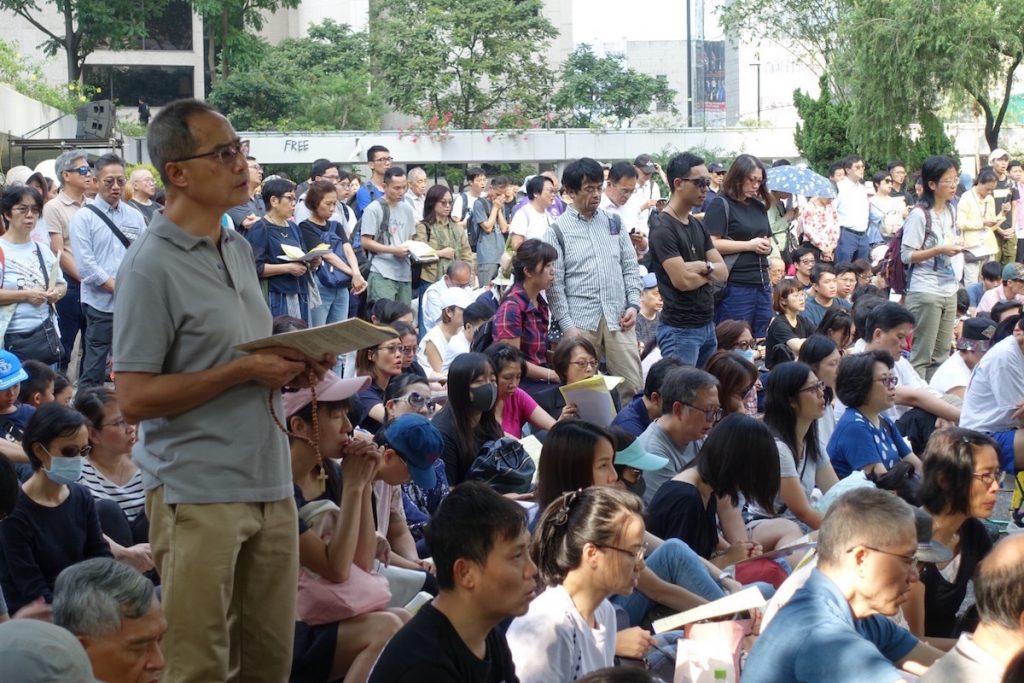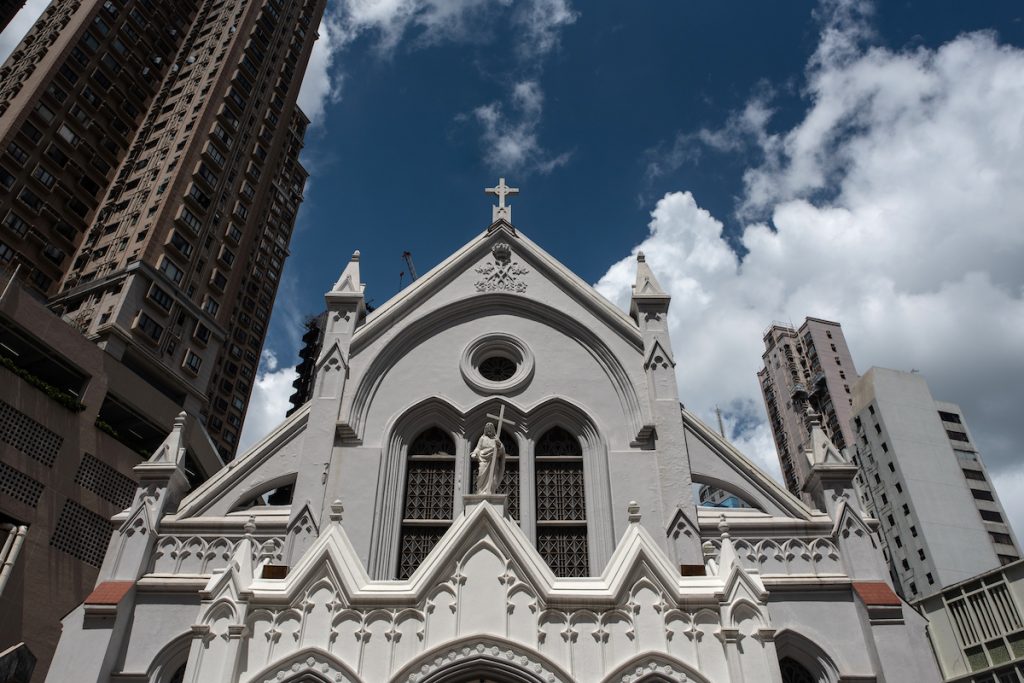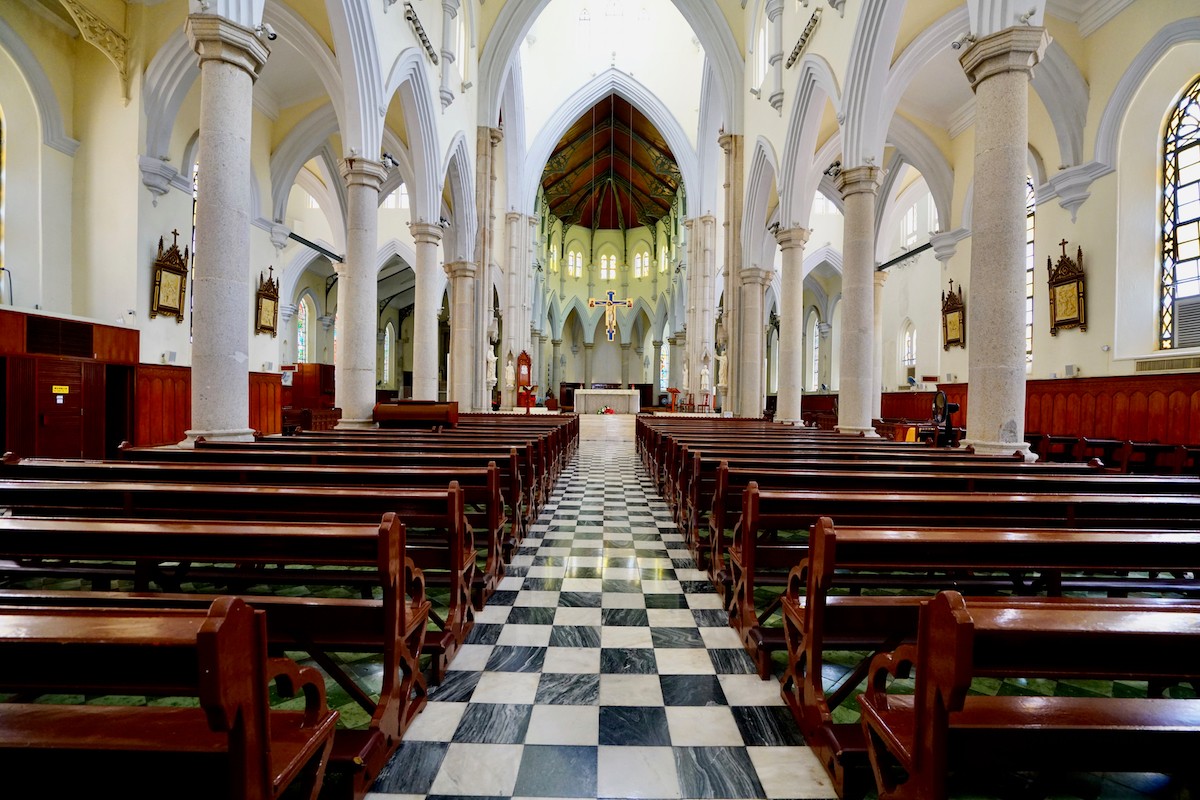Speaking publicly under his own name for the first time, a Hong Kong priest said the Chinese Communist Party is using ideological tactics such as re-education and propaganda to chip away at the freedom of religion in Hong Kong, which came under Chinese control in 1997.
Speaking on an April 21 episode of EWTN’s “The World Over,” Father Vincent Woo, a priest of the Diocese of Hong Kong and a canon lawyer, said that because the CCP wants to control every aspect of society, that naturally includes the practice of religion.
Woo said that he has observed that many Christian leaders are reluctant to speak out against the CCP’s actions, for fear of being detained, or worse, by civil authorities. Recently, he noted, a Protestant pastor was detained and charged with sedition for speaking on his YouTube channel in support of an organizer of a Tiananmen Square vigil.
“As priests and bishops, we are called to be prophets, to speak out against injustice in our society,” he said.
“But that example of the Protestant pastor shows priests and bishops in Hong Kong that if you preach something against the government, there will be tremendous consequences, and because of that in the past two years, you rarely see any priest or bishop in Hong Kong that would say anything publicly against the Hong Kong government or the CCP.”
Hong Kong is a special administrative region of China, whose citizens historically enjoyed freedom of religion, while on the Chinese mainland eligious believers of all stripes are routinely restricted, surveilled, and oppressed by the communist government.
This repression by the government is not new. Woo praised the heroic witness of Cardinal Ignatius Kung Pin-Mei, archbishop of Shanghai in the 1950s, who was jailed for 33 years for refusing to pledge allegiance to the state.
And since 2019, the CCP has intensified efforts to curtail free speech in Hong Kong through various means, including in 2020 by bypassing Hong Kong’s legislature to impose new National Security laws on the territory that gives China greater power to prosecute those who criticize the government.
Under the guise of “inculturation,” the Chinese government has for several years been pursuing a policy of “sinicization,” seeking to make religious faith more Chinese, Woo said. The Chinese government is pursuing a policy whereby anything in Christian teaching that is not in conformity with socialist teaching will have to be “cast out,” he said.

A Reuters report from late December documented an October 2021 meeting at which Chinese bishops and religious leaders briefed senior Hong Kong Catholic clergymen on President Xi Jinping’s vision of religion with “Chinese characteristics.”
Priests in mainland China are required to register with the government in order to be able to minister openly. In the process of doing so, they are expected to acknowledge the government’s policy of sinicization. The Vatican has said that it “respects the choice” of priests who refuse to register.
“Being registered civilly is not just signing a piece of paper. When you register you’re enrolled in ‘the system,’ meaning that the government will issue [you] a license to preach, to perform public ministry,” Woo noted.
“But in order for you to renew your license, you have to fulfill certain criteria,” he said, such as attending re-education classes. And the licenses can be revoked at any time, he said.
In mainland China, there exists an underground Catholic Church, which is persecuted and loyal to Rome. Government-approved Catholic Churches, on the other hand, have comparatively more freedom of worship, but face other challenges, including pressure from the government to censor parts of Catholic teaching, while including Chinese nationalism and love for the party in preaching.
Most underground bishops are jailed or are very old, Woo said, making the future of the underground Church uncertain.
Woo opined that CCP will likely set its sights on controlling Christian schools in Hong Kong, in an attempt to control the minds of young people.

Hong Kong’s 2020 National Security law has a clause that all students must be educated on the law, he noted. Many religious schools associated with parishes, and parishes, could be held accountable for what the school does if they do not comply with the National Security law, and parishes could be shut down as a result.
Xi’s communist government is “notorious for breaking its promises,” Woo warned, and thus any dialogue between the government and the Vatican will prove extremely difficult.
Woo also mentioned that it is encouraging to Catholics in Hong Kong that media mogul Jimmy Lai, a Catholic and billionaire who has been charged under the National Security laws, has chosen not to flee Hong Kong despite being likely to spend years in prison.
“He wants to suffer with all the protesters who are jailed in Hong Kong,” Woo said, adding that he sees Lai’s actions as “taking up his cross” like Christ.
When asked whether he is worried about what might happen to him now that he is speaking out, Woo said: “I’m the only person in my diocese who is able to do it at the moment.”
“When I answer to God, I will have to answer for why I did not speak out in April 2022 for those who are voiceless. I have no choice, I have to do it,” Woo concluded.
At the end of January, the Chinese-language newspaper Ta Kung Pao published four articles about Catholicism in Hong Kong, one of them about Hong Kong archbishop emeritus Cardinal Joseph Zen.
Zen, 90, has been a strong advocate of the Hong Kong pro-democracy movement for years, and is a sharp critic of the 2018 Vatican-China deal on the appointment of bishops. Woo said Zen taught him philosophy while he was in seminary, and that Zen has inspired many young priests, like himself.
The newspaper article categorized Zen as an enemy of the CCP in the same vein as Falun Gong, a highly persecuted religious minority in China. The paper also called for Hong Kong’s religious institutions to be placed under government control, AsiaNews reported.







